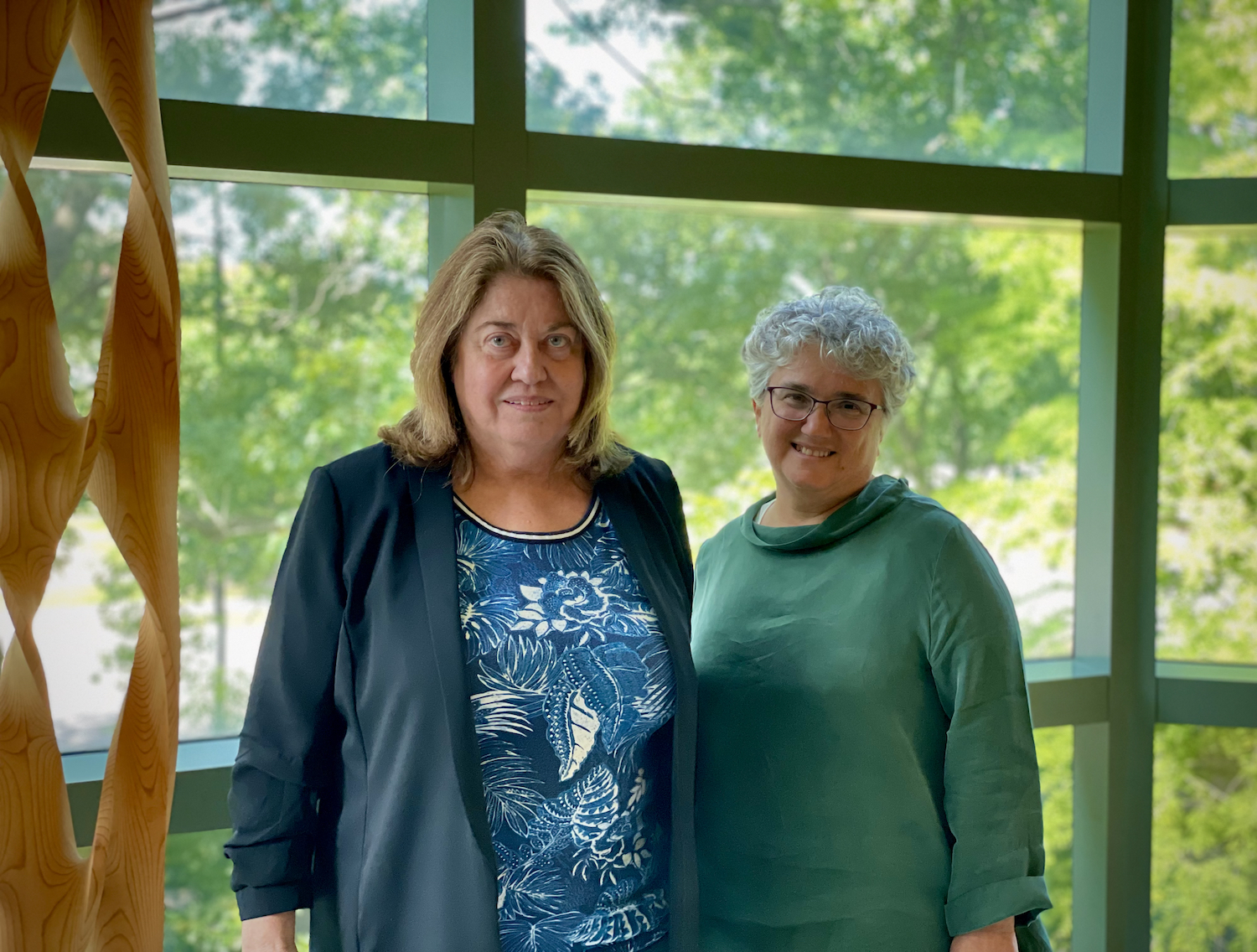Article
 Monica Fabiani and Frini Karayanidis at the Beckman Institute. Credit: Elizabeth Bello, Beckman Communications Office.
Monica Fabiani and Frini Karayanidis at the Beckman Institute. Credit: Elizabeth Bello, Beckman Communications Office.
Longtime friends and research collaborators Monica Fabiani and Frini Karayanidis were reunited this summer through the Beckman Institute Senior Fellows Program.
The program offers established researchers funding and the opportunity to do short-term, interdisciplinary research at the Beckman Institute for Advanced Science and Technology.
Fabiani is a professor of psychology and neuroscience at the University of Illinois Urbana-Champaign. Across the Pacific Ocean, Karayanidis is a professor of psychology and neuroscience at the University of Newcastle in Australia. Karayanidis received the 2024 Beckman Institute Senior Fellowship, as well as in 2016.
Despite the distance, the two researchers created synergistic projects that focus on studying brain health in relation to aging.
“We both have an interest in the psychology of aging or the cognitive neuroscience of aging and since my last visit in 2016, we started working toward getting joint grants together,” Karayanidis said. “I’ve been a consultant on [Fabiani’s] NIH grant and [Fabiani] has been a chief investigator on my grants in Australia.”
Prior to the 2016 visit, Karayanidis acquired a system that allowed her to collect the same data, on a smaller scale, that Fabiani and Gabriele Gratton, codirector of the Cognitive Neuroimaging Laboratory and professor of psychology and neuroscience, were taking at Beckman. This made their work complementary.
Fabiani and Karayanidis are currently conducting two studies to understand how lifestyle factors such as sleep, nutrition and physical activity impact vascular health in older adults and how those changes impact brain health and cognitive health over time.
The ACTIVate study, based in Australia, investigates how various lifestyle patterns affect vascular health, brain function and cognitive behavior in adults ranging from age 60-70 years old over 5 years.
The Arteries, Brain and Cognition study, or ABC study, takes a reverse approach and employs intense cognitive training to patients over a 3-month period. Rather than observing change over time, the goal is to create change and evaluate the impact of cognition through the pathway of a vascular effect.
“We’re looking to see if particular areas of the brain that are challenged by the training will change and will that then explain behavioral changes over time,” Karayanidis said.
Fabiani and Karayanidis have kept their collaborations strong through joint grants, projects and papers. Weekly virtual meetings and periodic trips abroad by both professors and their students has facilitated a true knowledge exchange between universities, leading to new discoveries and innovations.
Although modern technology and virtual platforms like Zoom have increased the feasibility of a partnership from opposite ends of the globe, Karayanidis emphasized the importance of being able to meet and work in person through programs like Beckman’s Senior Fellows Program.
“Coming together means that we can put aside some time to hothouse. I’m also attending all their meetings which means that I’m understanding the approaches they’re using to do particular analyses, and it strengthens the collaboration,” Karayanidis said.
Students benefit from the exchange as well.
“Not long ago two students came [to Beckman] for a month and a half and so they again participated in meetings but also were there recording data so that when they go home, they can take expertise back,” Fabiani said.
Illinois researchers and staff have also traveled to Karayanidis’ lab in Australia.
Working together in person gave Fabiani and Karayanidis the opportunity to brainstorm, recreate ideas, regroup and enabled them to have more fluid conversations and to plan future work.
Closer to home, the duo also uses multimodal imaging facilities at the Beckman Institute to study the brain. They collaborate with Brad Sutton, the technical director of Beckman's Biomedical Imaging Center, and other imaging faculty to run functional and structural MRIs, optical imaging tests and electrophysiology tests such as electrocardiograms and electroencephalograms.
Fabiani and Karayanidis plan to continue their research together and expect to publish a series of papers within the next year.
Karayanidis hopes to ultimately take what they’re doing in the lab, with very expensive equipment and time-consuming analyses, and translate it to clinical settings as a tool to monitor brain vascular health and screen for early markers of unhealthy brain aging.
Editor’s notes:
Beckman faculty members can apply to sponsor a Senior Fellow. Submission deadlines are March 15 and Oct. 15 each year. Decisions will be made by April 1 and Nov. 1, respectively. The Beckman Institute Director and Associate Director for Research evaluate applications twice annually.
Brad Sutton is a professor of bioengineering, biomedical and translational sciences, electrical and computer engineering and neuroscience at Illinois.
Media contact: Jenna Kurtzweil, kurtzwe2@illinois.edu
Beckman Institute for Advanced Science and Technology